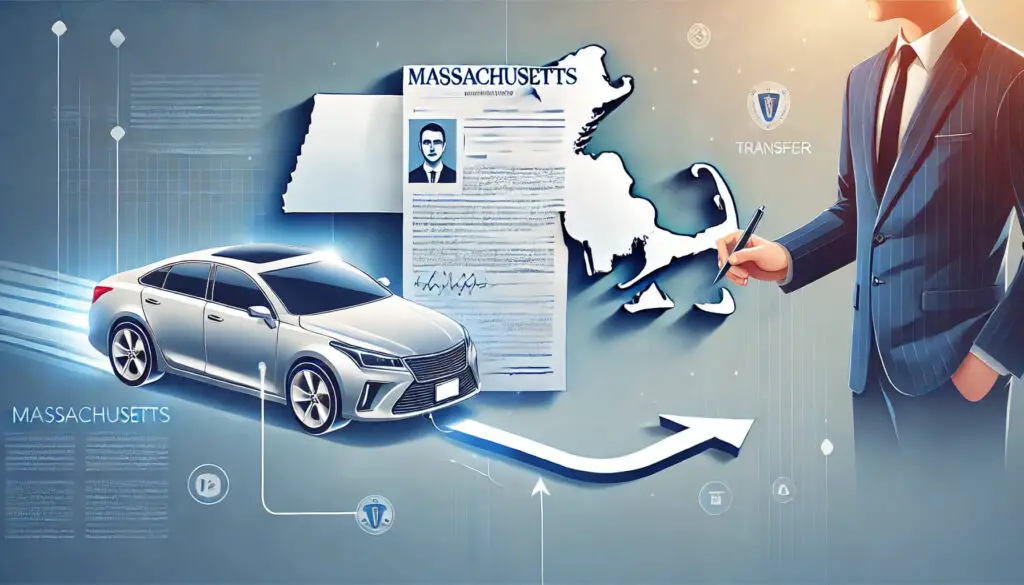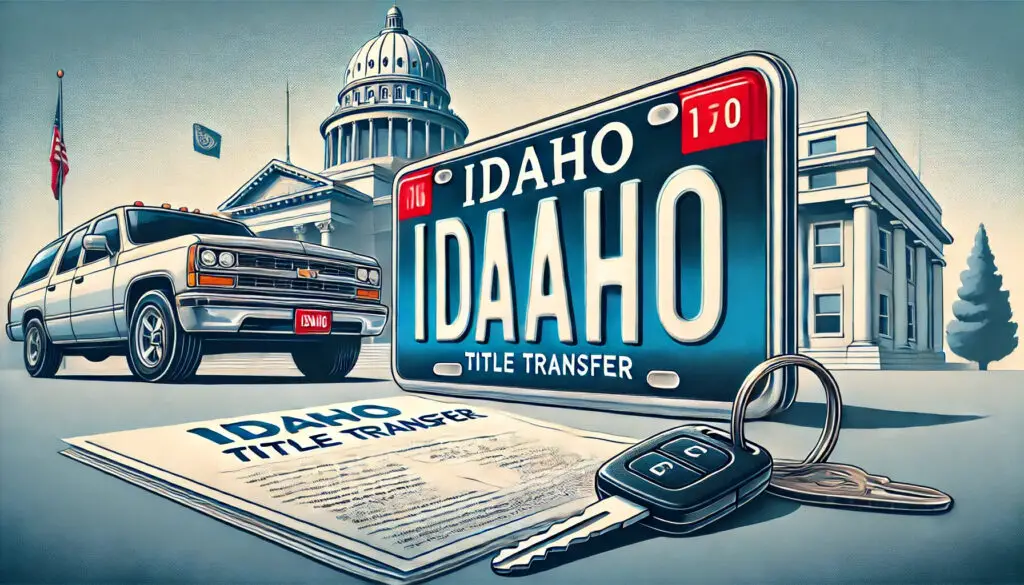Transferring a vehicle title in Massachusetts is a crucial procedure when buying, selling, or transferring ownership of a vehicle. Understanding the Massachusetts title transfer process ensures a smooth transaction and compliance with state laws. Whether you’re a first-time buyer or a seasoned vehicle owner, this guide provides a detailed step-by-step breakdown to help you navigate the intricacies of title transfers in Massachusetts. We’ll cover everything from required documents to common mistakes to avoid, ensuring a hassle-free experience.
What Is Title Transfer in Massachusetts?
Title transfer in Massachusetts is the official process by which ownership of a vehicle is legally changed from one person to another. The title is a legal document that proves ownership of a vehicle. A title transfer is essential when purchasing or selling a vehicle, transferring it as a gift, or inheriting one.
In Massachusetts, title transfer also involves ensuring that any liens on the vehicle are cleared, all taxes are paid, and the new owner registers the vehicle with the Registry of Motor Vehicles (RMV).
Required Documents for Massachusetts Title Transfer
1. Original Title
The original title is the most important document for the title transfer. It serves as proof of ownership and must be submitted to the RMV. If the title is lost or damaged, you’ll need to apply for a duplicate title before proceeding with the transfer.
2. Bill of Sale
A Bill of Sale is a critical document that outlines the details of the transaction, including the buyer’s and seller’s names, vehicle information (VIN, make, model), and the agreed-upon price. This document serves as evidence of the transaction and helps protect both parties in case of future disputes.
3. Identification
Both the buyer and seller must provide valid, government-issued identification. This is crucial to ensure that the parties involved in the transaction are legitimate and to prevent fraud.
4. Odometer Disclosure Statement
An Odometer Disclosure Statement is required for vehicles that are less than 10 years old. This document records the vehicle’s mileage at the time of transfer and helps prevent odometer fraud.
5. Lien Releases
If there is a lien on the vehicle, the lienholder must provide a release of lien, indicating that the vehicle is no longer under financial obligation. This document is essential for ensuring that the title can be legally transferred to the new owner.
6. Insurance
Proof of valid Massachusetts insurance is required to complete the title transfer. This shows that the vehicle is covered under a policy that complies with state laws.
Steps to Transfer Title in Massachusetts
Step 1: Gather All Required Documents
Before starting the process, ensure that you have all the necessary documents. This includes the original title, bill of sale, identification, insurance proof, and any lien release documents if applicable. Double-check everything to avoid delays.
Step 2: Visit the RMV
Head to your local Registry of Motor Vehicles office to begin the title transfer. Some RMV locations require appointments, so check beforehand. At the RMV, you’ll submit your documents, and the staff will guide you through the process.
Step 3: Complete the RMV-1 Form
The RMV-1 form is required for registering and titling a vehicle in Massachusetts. This form asks for information such as vehicle details, your personal information, and proof of insurance. Ensure that all fields are filled out accurately to avoid issues.
Step 4: Pay Fees and Taxes
The title transfer process comes with certain fees. These include the title transfer fee, registration fees, and sales tax. Be prepared to pay these at the time of the transfer. The RMV will provide a breakdown of the costs during the process.
Step 5: Submit Your Documents
After completing the form and paying the fees, submit all required documents to the RMV. The RMV staff will verify the information and process the transfer. If everything is in order, the transaction will proceed smoothly.
Step 6: Receive the New Title
Once the transfer is processed, the RMV will issue a new title in the name of the buyer. This may take a few weeks, so be sure to check the status of the title transfer through the RMV website or by contacting the office directly.
Special Considerations in Massachusetts Title Transfer
Out-of-State Vehicles
For vehicles purchased outside Massachusetts, additional documentation may be required, such as the out-of-state title and proof of emissions inspection. Ensure that all necessary documents are in order to avoid delays.
Dealer Purchases
When purchasing a vehicle from a dealership, the dealership will usually handle the title transfer for you. However, you may still need to provide your identification, proof of insurance, and payment for fees.
Title Transfer as a Gift
Transferring a title as a gift involves specific procedures. Both the donor and recipient must complete the necessary forms, and the recipient may be exempt from paying sales tax, depending on the value of the vehicle. Gift transfers require an affidavit confirming the gift nature of the transaction.
Key Reminders During Title Transfer
Appointment Scheduling
To avoid long wait times, consider making an appointment at your local RMV. This can help speed up the process and ensure you get the necessary assistance without unnecessary delays.
Accuracy of Information
Ensure that all information is complete and accurate before submitting documents. Inaccurate forms or missing information can lead to delays or rejection of your transfer request.
Retaining Copies of Documents
Always make copies of all documents you submit to the RMV, including the title, bill of sale, and identification. This will help protect you in case any issues arise later.
Common Mistakes to Avoid in Title Transfer
- Incomplete or Incorrect Forms: Double-check the RMV-1 form and any other required paperwork before submission.
- Missing or Incorrect Supporting Documents: Ensure that you have all the required documents, including proof of insurance, a valid ID, and the original title.
- Failure to Pay Fees on Time: Make sure to pay all required fees promptly to avoid delays in the process.
Helpful Resources for Massachusetts Title Transfers
- Massachusetts Registry of Motor Vehicles (RMV): The official RMV website provides comprehensive resources and forms for title transfer.
- BlueNotary Guide: An in-depth guide on transferring out-of-state vehicle titles.
- Skip Guide: A detailed resource for transferring vehicle titles in Massachusetts.
Frequently Asked Questions (FAQs)
What is the Fee for Title Transfer in Massachusetts?
The title transfer fee in Massachusetts varies, but you can expect to pay approximately $75 for the title transfer and an additional fee for vehicle registration. Sales tax may also apply.
How Long Does the Title Transfer Process Take?
The title transfer process can take up to 6 weeks to complete, depending on the RMV’s processing time. You can track the status of your title through the RMV website.
Can I Transfer a Title Without the Original Title Document?
No, the original title is required for a legal transfer of ownership. If the original title is lost, you must apply for a duplicate title before proceeding with the transfer.
What Happens If I Don’t Have a Bill of Sale?
Without a Bill of Sale, the RMV may not process the title transfer. The document is required to prove the transaction and the terms of the sale.
Can I Complete the Title Transfer Process Online?
Yes, the RMV offers online services for certain title transfers. However, in-person visits may still be required in some cases, especially for out-of-state or complex transfers.
What If My Vehicle Has a Lien?
If your vehicle has a lien, the lienholder must provide a release of lien before the title can be transferred.
Can a Title Be Transferred as a Gift?
Yes, you can transfer a title as a gift. Special procedures apply, and the recipient may be exempt from sales tax.
How Do I Transfer a Title for a Deceased Relative’s Vehicle?
To transfer the title of a deceased relative’s vehicle, you must submit the death certificate, proof of legal authority (such as a will or probate documents), and other required forms.
Conclusion
The Massachusetts title transfer process is straightforward, but it requires careful attention to detail. By following the steps outlined in this guide and ensuring you have all the required documents, you can avoid common mistakes and complete the transfer smoothly. Always consult the RMV for the latest requirements and information, as rules may change.











